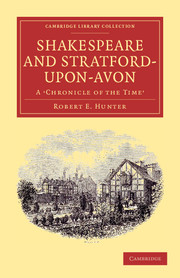STRATFORD: A WALK THROUGH THE TOWN
Published online by Cambridge University Press: 29 August 2010
Summary
Of the many places in our own country from winch the ordinary tourist's attention is withdrawn by scenes to which distance lends enchantment, and that very arbitrary deity, “Fashion,” their main attraction, no region can, in ordinary times, prefer a stronger complaint of ingratitude than the picturesque town of Stratford-upon-Avon. True, during the last London Exhibition year some seven thousand names were enrolled in the visitors' book of the church containing Shakespeare's tomb, but many of these were Germans and Americans ; and in the course of the past fortnight at least one hundred thousand persons came to Stratford. But, generally speaking, tourists have not taken that interest in the locality which it is to be hoped the late celebration may create.
Yet Stratford-upon-Avon is the true “British Mecca”—to which every thoughtful pilgrim, every man of poetic feeling, every traveller with the slightest tincture of philosophy or philanthropy, must ever delight to wend his way. Here he will find food for meditation—a town scarcely surpassed in the beauty of its situation on the lovely
“Winding Avon's willowed banks,”
and unapproachable in the universal interest of its associations. For here, it can never be forgotten, in Stratford-upon-Avon, William Shakespeare was born ; here the man for whose fame “Kings might wish to die,” and which has been for generations “as broad and general as the casing air,” first saw the light; here he received such education as he possessed ; and from this picturesque spot his young muse, destined to ascend “invention's highest heaven,” first began her upward flight.
- Type
- Chapter
- Information
- Shakespeare and Stratford-upon-AvonA 'Chronicle of the Time', pp. 58 - 72Publisher: Cambridge University PressPrint publication year: 2009First published in: 1864



